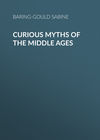Читать книгу: «Eve», страница 27
CHAPTER LIV.
ANOTHER LOAD
The sad procession moved to Morwell out of the wood, preceded by the man Westlake, mounted on Jasper’s horse, riding hard for the doctor. Then came a stable-boy with the lantern, and after the light two gates – first, that on which was laid the dead body of Mr. Jordan; then another, followed closely by Barbara, on which lay Eve breathing, but now not even moaning. As the procession was half through the first field the bell of the house tolled. Westlake had communicated the news to the servant-maids, and one of them at once went to the bell.
Lagging behind all came Joseph Woodman, the policeman. The King of France in the ballad marched up a hill, and then marched down again, having accomplished nothing. Joseph had reversed the process: he had leisurely marched down the hill, and then more leisurely marched up it again; but the result was the same as that attained by the King of France.
On reaching Morwell Jasper said in a low voice to the men, ‘You must return with me: there is another to be sought for. Who saw the boy with the lantern last? He may have found him by this time.’
Then Joseph said slowly, ‘As I was down by the boathouse I saw something.’
‘What did you see?’
‘I saw up on the hill-side a lantern travelling this way, then that way, so’ – he made a zigzag indication in the air with his finger. ‘It went very slow. It went, so to speak, like a drop o’ rain on a window-pane, that goes this way, then it goes a little more that way, then it goes quite contrary, to the other side. Then it changes its direction once again and it goes a little faster.’
‘I wish you would go faster,’ said Jasper impatiently. ‘What did you see at last?’
‘I’m getting into it, but I must go my own pace,’ said Joseph with unruffled composure. ‘You understand me, brothers – I’m not speaking of a drop o’ rain on a window-glass, but of a lantern-light on the hill-side – and bless you, that hill-side was like a black wall rising up on my right hand into the very sky. Well then, the light it travelled like a drop o’ rain on a glass – first to this side, then to that. You’ve seen drops o’ rain how they travel’ – he appealed to all who listened. ‘And I reckon you know how that all to once like the drop, after having travelled first this road, then that road, in a queer contrary fashion, and very slow, all to once like, as I said, down it runs like a winking of the eye and is gone. So exactly was it with thicky (that) there light. It rambled about on the face of the blackness: first it crawled this way, then it crept that; always, brothers, going a little lower and then – to once – whish! – I saw it shoot like a falling star – I mean a raindrop – and I saw it no more.’
‘And then?’
‘Why – and then I came back the same road I went down.’
‘You did not go into the bushes in search?’
‘How should I?’ answered Joseph, ‘I’d my best uniform on. I’d come out courting, not thief-catching.’
‘And you know nothing further?’
‘How should I? Didn’t I say I went back up the road same way as I’d come down? I warn’t bound to get my new cloth coat and trousers tore all abroad by brimbles, not for nobody. I know my duty better than that. The county pays for ‘em.’
Directed by this poor indication, Jasper led the men back into the wood and down the woodman’s truck road, that led by a long sweep to the bottom of the cliffs.
The search was for a long time ineffectual; but at length, at the foot of a rock, they came on the object of their quest – the body of Martin – among fragments of fallen crag, and over it, clinging to his brother with one arm, the hand passed through the ring of a battered lantern, was Walter. The light was extinguished in the lantern and the light was beaten out of the brothers. Jasper looked into the poor boy’s face – a scornful smile still lingered on the lips.
Apparently he had discovered his brother’s body and then had tried to drag it away down the steep slope towards the old mine, in the hopes of hiding there and finding that Martin was stunned, not dead; but in the darkness he had stumbled over another precipice or slidden down a run of shale and been shot with his burden over a rock. Again the sad procession was formed. The two gates that had been already used were put in requisition a second time, and the bodies of Martin and Watt were carried to Morwell and laid in the hall, side by side, and he who carried a light placed it at their head.
Mr. Coyshe had arrived. For three of those brought in no medical aid was of avail.
Barbara, always practical and self-possessed, had ordered the cook to prepare supper for the men. Then the two dead brothers were left where they had been laid, with the dull lantern burning at their head, and the hungry searchers went to the kitchen to refresh.
Joseph ensconced himself by the fire, and Jane drew close to him.
‘I reckon,’ said the policeman, ‘I’ll have some hot grog.’ Then he slid his arm round Jane’s waist and said, ‘In the midst of death we are in life. Is that really, now, giblet pie? The cold joint I don’t fancy’ – he gave Jane a smack on the cheek. ‘Jane, I’ll have a good help of the giblet pie, please, and the workmen can finish the cold veal. I like my grog hot and strong and with three lumps of double-refined sugar. You’ll take a sip first, Jane, and I’ll drink where your honeyed lips have a-sipped. When you come to consider it in a proper spirit’ – he drew Jane closer to his side – ’there’s a deal of truth in Scriptur’. In the midst of death we are in life. Why, Jane, we shall enjoy ourselves this evening as much as if we were at a love-feast. I’ve a sweet tooth, Jane – a very sweet tooth.’
CHAPTER LV.
WHAT EVERY FOOL KNOWS
Jasper stood on the staircase waiting. Then he heard a step descend. There was no light: the maids, in the excitement and confusion, had forgotten their duties. No lamp on the staircase, none in the hall. Only in the latter the dull glimmer of the horn lantern that irradiated but did not illumine the faces of two who were dead. The oak door at the foot of the stairs was ajar, and a feeble light from this lantern penetrated to the staircase. The window admitted some greyness from the overcast sky.
‘Tell me, Barbara,’ he said, ‘what is the doctor’s report?’
‘Jasper!’ Then Barbara’s strength gave way, and she burst into a flood of tears. He put his arm round her, and she rested her head on his breast and cried herself out. She needed this relief. She had kept control over herself by the strength of her will. There was no one in the house to think for her, to arrange anything; she had the care of everything on her, beside her great sorrow for her father, and fear for Eve. As for the servant girls, they were more trouble than help. Men were in the kitchen; that sufficed to turn their heads and make them leave undone all they ought to have done, and do just those things they ought not to do. At this moment, after the strain, the presence of a sympathetic heart opened the fountain of her tears and broke down her self-restraint.
Jasper did not interrupt her, though he was anxious to know the result of Mr. Coyshe’s examination. He waited patiently, with the weeping girl in his arms, till she looked up and said, ‘Thank you, dear friend, for letting me cry here: it has done me good.’
‘Now, Barbara, tell me all.’
‘Jasper, the doctor says that Eve will live.’
‘God’s name be praised for that!’
‘But he says that she will be nothing but a poor cripple all her days.’
‘Then we must take care of her.’
‘Yes, Jasper, I will devote my life to her.’
‘We will, Barbara.’
She took his hand and pressed it between both hers.
‘But,’ she said hesitatingly, ‘what if Mr. Coyshe – ’ She did not finish the sentence.
‘Wait till Mr. Coyshe claims her.’
‘He is engaged to her, so of course he will, the more readily now that she is such a poor crushed worm.’
Jasper said nothing. He knew Mr. Coyshe better than Barbara, perhaps. He had taken his measure when he went with him over the farm after the signing of the will.
‘This place is hers by her father’s will,’ said Jasper; ‘and, should the surgeon draw back, she will need you and me to look after her interests.’
‘Yes,’ said Barbara, ‘she will need us both.’
Then she withdrew her hands and returned upstairs.
A few days later Mr. Coyshe took occasion to clear the ground. He explained to Barbara that his engagement must be considered at an end. He was very sorry, but he must look out for his own interests, as he had neither parent alive to look out for them for him. It would be quite impossible for him to get on with a wife who was a cripple.
‘You are premature, Mr. Coyshe,’ said Miss Jordan stiffly. ‘If you had waited till my sister were able to speak and act, she would have, herself, released you.’
‘Exactly,’ said the unabashed surgeon; ‘but I am so considerate of the feelings of the lady, that I spare her the trouble.’
And now let us spread the golden wings of fancy, and fly the scenes of sorrow – but fly, not in space, but in time; measure not miles, but months.
It is autumn, far on into September, and Michaelmas has brought with it the last days of summer. Not this the autumn that we saw coming on, with the turning dogwood and bird-cherry, but another.
In the garden the colchicum has raised its pale lilac flowers. The Michaelmas daisy is surrounded by the humming-bird moth with transparent wings, but wings that vibrate so fast that they can only be seen as a quiver of light. The mountain ash is hung with clusters of clear crimson berries, and the redbreasts and finches are about it, tearing improvidently at the store, thoughtless of the coming winter, and strewing the soil with wasted coral.
Eve is seated in the sun outside the house, in the garden, and on her knees is a baby – Barbara’s child, and yet Eve’s also, for if Barbara gave it life, Eve gave it a name. Before her sister Barbara kneels, now just restored from her confinement, a little pale and large in eye, looking up at her sister and then down at the child. Jasper stands by contemplating the pretty group.
‘Eve,’ said Barbara in a low tremulous voice, ‘I have had for some months on my heart a great fear lest, when my little one came, I should love it with all my heart, and rob you. I had the same fear before I married Jasper, lest he should snatch some of my love away from the dear suffering sister who needs all. But now I have no such fear any more, for love, I find, is a great mystery – it is infinitely divisible, yet ever complete. It is like’ – she lowered her voice reverently – ’it is like what we Catholics believe about the body of our Lord, the very Sacrament of Love. That is in Heaven and in every church. It is on every altar, and in every communicant, entire. I thought once that when I had a husband, and then a little child, love would suffer diminution – that I could not share love without lessening the portion of each. But it is not so. I love my baby with my whole undivided heart; I love you, my sister, equally with my whole undivided heart; and I love my husband also,’ she turned and smiled at Jasper, ‘with my very whole and undivided heart. It is a great mystery, but love is divine, and divine things are perceived and believed by the heart, though beyond the reason.’
‘So,’ said Eve, smiling, and with her blue eyes filling, ‘my dear, dear Barbara, once so prosaic and so practical, is becoming an idealist and poetical.’
‘Wherever unselfish love reigns, there is poetry,’ said Jasper; ‘the sweetest of the songs of life is the song of self-sacrificing love. Barbara never was prosaic. She was always an idealist; but, my dear Eve, the heart needs culture to see and distinguish true poetry from false sentiment. That you lacked at one time. That you have now. I once knew a little girl, light of heart, and loving only self, with no earnest purpose, blown about by every caprice. Now I see a change – a change from base element to a divine presence. I see a sweet face as of old, but I see something in it, new-born; a soul full of self-reproach and passionate love; a heart that is innocent as of old, but yet that has learned a great deal, and all good, through suffering. I see a life that was once purposeless now instinct with purpose – the purpose to live for duty, in self-sacrifice, and not for pleasure. My dear Eve, the great and solemn priest Pain has laid his hands on you and broken you, and held you up to Heaven, and you are not what you were, and yet – and yet are the same.’
Eve could not speak. She put her arms round her sister’s neck, and clung to her, and the tears flowed from both their eyes, and fell upon the tiny Eve lying on the knees of the elder Eve.
But though they were clasped over the child, no shadow fell on its little face. The baby laughed.
…
Some years ago – the author cannot at the moment say how many, nor does it matter – he paid a visit to Morwell, and saw the sad havoc that had been wrought to the venerable hunting-lodge of the Abbots of Tavistock. The old hall had disappeared, a floor had been put across it, and it had been converted into an upper and lower story of rooms. One wing had been transformed into a range of model cottages for labourers. The house of the Jordans was now a farm.
The author asked if he might see the remains of antiquity within the house.
An old woman who had answered his knock and ring, replied, ‘There are none – all have been swept away.’
‘But,’ said he, ‘in my childhood I remember that the place was full of interest; and by the way, what has become of the good people who lived here? I have been in another part of the country, and indeed a great deal abroad.’
‘Do you mean Mr. Jasper?’
‘No: Jasper, no – the name began with J.’
‘The old Squire Jordan your honour means, no doubt. He be dead ages ago. Mr. Jasper married Miss Jordan – Miss Barbara we called her. When Miss Eve died, they went away to Buckfastleigh, where they had a house and a factory. There was a queer matter about the old squire’s death – did you never hear of that, sir?’
‘I heard something; but I was very young then.’
‘My Joseph could tell you all about it better than I.’
‘Who is your Joseph?’
‘Well, sir, I’m ashamed to say it, but he’s my sweetheart, who’s been a-courting of me these fifty years.’
‘Not married yet?’
‘He’s a slow man is Joseph. I reckon he’d ‘a’ spoken out if he’d been able at last, but the paralysis took ‘m in the legs. He put off and off – and I encouraged him all I could; but he always was a slow man.’
‘Where is he now?’
‘Oh, he’s with his married sister. He sits in a chair, and when I can I run to ‘m and take him some backy or barley-sugar. He’s vastly fond o’ sucking sticks o’ barley-sugar. Gentlefolks as come here sometimes give me a shilling, and I lay that out on getting Joseph what he likes. He always had a sweet tooth.’
‘Then you love him still?’
The old woman looked at me with surprise. Her hand and head shook.
‘Of course I does: love is eternal – every fool knows that.’





















